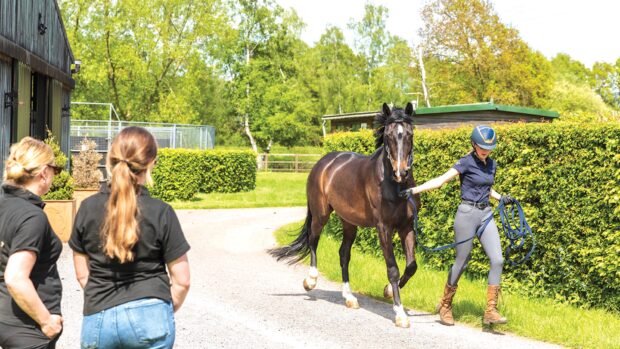Disclosure, contracts and “crystal-clear” lines – how buyers and sellers can best protect themselves in today’s industry was discussed by top equestrian legal professionals at a recent webinar.
Hannah Bradley, of the Equine Law Firm, and Jodie Seddon, of Aria Grace Equine Law, took attendees through some of the basic steps they can take to help navigate potential pitfalls that may arise in buying and selling horses.
The pair strongly recommended having a contract drawn up specifically for that particular sale, stressed the importance of disclosure in deals, and advised people to listen to their senses when ascertaining whether a horse and potential buyer may be a good fit.
“You wouldn’t be alone if you thought, ‘I don’t have a written contract, so I don’t have a contract’, but that is not actually correct,” said Ms Seddon. “When you have an offer, an acceptance, payment and delivery, that’s a contract.
“Now, whether or not you control all the elements within that contract is key. And if you assume you don’t have a contract, what you actually have is a contract formed of what you’ve said, what you’ve done, text messages, WhatsApp messages, the advert, any chat you’ve had.
“Effectively, the contract can be formed around the whole process around the dealing – unless you actually ensure that there is a sales contract.
“A well-drafted sales contract will exclude an awful lot of the surrounding noise to distil down to exactly what you’re buying, when and where. Well done, it should be a really simple, user-friendly document that you can use to ensure that you understand exactly what you’re selling, when and to whom.”
She added: “A contract can never ever, ever replace a good working relationship with people, but it does enhance it.”
Both lawyers recommended people be careful around wording of adverts (“keep it factual”), that they retain as much evidence as they can, that the basics such as payment amounts and schedules are “crystal clear”, that both sides ensure that they have contact details, and that any issues are ideally disclosed in writing.
“You absolutely cannot contract your way out of the Consumer Rights Act [in situations where that applies],” added Ms Seddon. “There is not a thing we can do to get you out of what the statutory responsibility within that is.
“It is not fit for purpose in terms of equestrians, as it is designed for selling things such as washing machines, but it is the world we live in, it is the landscape we have and we can’t change it. That said, the best protection is always disclosure within a sales contract.”
If problems do arise, both urged parties to be professional in their responses, seek professional legal advice sooner rather than later, and never ignore court deadlines or requests. H&H has covered the role of agents in deals (news, 29 December 2022) – and again, the pair stressed that clarity and disclosure in this area are vital.
Ms Bradley shared her “top three tips” as disclosing details such as horses’ quirks, biases, habits and veterinary and management issues in writing – but do not put these on a receipt, as this may be considered as being “post-contractual”, meaning it might not be able to be relied upon as information given at the time of the sale.
“If you think that the buyer is not the right match, they probably aren’t,” she said. “It’s certainly better to lose a sale than end up in litigation about it. Finally, as a litigation lawyer, it’s always easier to defend you if you use a well-drafted contract.”
She added: “It’s important to be aware that if in any circumstances it’s not proportionate or not possible to get a proper contract drafted, any disclosures you can make in writing or important points that you can get in writing are going to help you.”
The webinar was the first in a series, with further subjects planned for near future.
You might also be interested in:

Subscribe to Horse & Hound magazine today – and enjoy unlimited website access all year round

How to avoid legal pitfalls when buying and selling horses
Horse & Hound magazine, out every Thursday, is packed with all the latest news and reports, as well as interviews, specials, nostalgia, vet and training advice. Find how you can enjoy the magazine delivered to your door every week, plus options to upgrade your subscription to access our online service that brings you breaking news and reports as well as other benefits.




